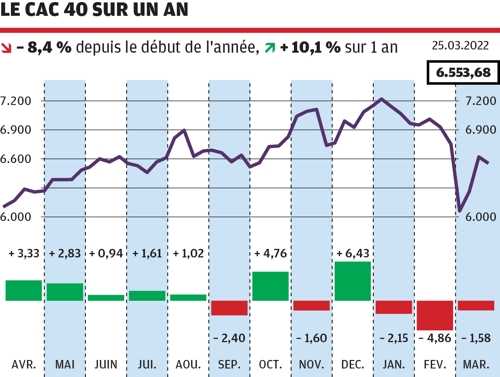The weak impact of the war on the United States allowed Wall Street to progress. Crude prices remained high despite the absence of a European embargo on Russian barrels.

On the thirtieth day of the war, one thing is clear: ignoring the thousands of victims, millions of Ukrainian refugees and Russian chemical or nuclear threats, the stock markets have regained height. Major US indexes have closed in the green six out of eight times since mid-March. For the Cac 40, it is a little more balanced (four sessions in the red out of eight), but it lacks barely 300 points to regain the level (6,780.67 points) of February 23, the day before the Russian offensive .
Investors know that the balance is fragile and that the conflict can escalate in a second, but they rather count on a stalemate. They therefore took advantage of the drop in the first few days to gradually recover. Wall Street is convinced that US economic growth will be strong enough to support the tightening of monetary policy. Not so on the Old Continent.
The conflict will further accentuate the historical economic imbalance with the United States. Europe is, in fact, very dependent on Russian oil and gas, which is not the case with the Americans (the world’s leading producers). It is therefore logical that the Federal Reserve should act – steering federal funds towards 3% at the end of the year – to curb galloping inflation, while the European Central Bank should rather think twice before risk it.
On the oil market, the fact that no embargo on Russian barrels was announced at the end of the various summits (NATO, G7, EU) organized this week in the presence of the American president allowed the price of crude to relax, returning from $123.71 on Thursday, to $117 on Friday. On the business front, two big names in the Cac 40, Renault and TotalEnergies, gave in to pressure and announced that they were distancing themselves from Russia. The first will suspend its industrial activity in the country, the second will stop buying Russian oil.
SYLVIE AUBERT
